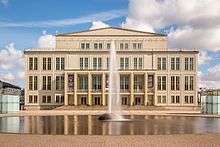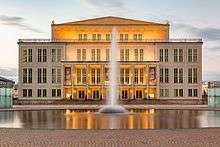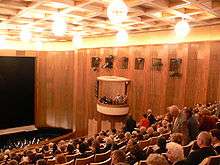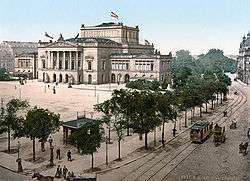Leipzig Opera



The Leipzig Opera (in German: Oper Leipzig) is an opera house and opera company located at the Augustusplatz in Leipzig, Germany.
History
The Leipzig Opera traces its establishment to the year 1693, making it the third oldest opera venue in Europe after La Fenice (Venice, Italy) and the Hamburg State Opera (Hamburg, Germany). The director of many of those early operas at the original Opernhaus auf dem Brühl was Telemann.
The Leipzig Opera does not have its own opera orchestra – the Leipzig Gewandhaus Orchestra performs as its orchestra. This relationship began in 1766 with performances of the Singspiel Die verwandelten Weiber, oder Der Teufel ist los by Johann Adam Hiller.
Opera House, 1868

The previous theater (the "Neues Theater") was inaugurated on 28 January 1868 with Jubilee Overture by Carl Maria von Weber and the overture for Iphigénie en Aulide by Gluck and Goethe's play Iphigenia in Tauris. From 1886 to 1888, Gustav Mahler was the second conductor; Arthur Nikisch was his superior. During an air raid in the night of 3 December 1943, part of the bombing of Leipzig in World War II, the theater was destroyed, as were all Leipzig's theatres.
Opera House, 1960
Construction of the modern opera house began in 1956. The theater was inaugurated on 8 October 1960 with a performance of Wagner's Die Meistersinger von Nürnberg.[1]
Since 2009, Ulf Schirmer is the Generalmusikdirektor (General Music Director, or GMD); he was elected artistic director in 2011 for a five-year term.
General Music Directors (GMD)
- Arthur Nikisch (1878)
- Gustav Mahler (1886–1888)
- Otto Lohse (1912)
- Gustav Brecher (1923)
- Paul Schmitz (1932)
- Helmut Seydelmann (1951)
- Paul Schmitz (1964)
- Lothar Zagrosek (1990–1992)
- Jiri Kout (1993)
- Michail Jurowski (1999)
- Riccardo Chailly (2005–2008)
- Ulf Schirmer (2009–present)
References
External links
| Wikimedia Commons has media related to Opernhaus Leipzig. |
Coordinates: 51°20′25″N 12°22′53″E / 51.34028°N 12.38139°E